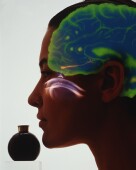
SUNDAY, July 13, 2014 (HealthDay News) — New research suggests that a faltering sense of smell might signal the early stages of Alzheimer’s disease, and that an inexpensive, low-tech smell test could spot who needs more extensive screening for dementia.
In two different studies, the decreased ability to identify odors was associated with the loss of brain cell function and progression to Alzheimer’s disease.
“We’re trying to be able to diagnose Alzheimer’s earlier and theoretically deliver drugs to people sooner,” said Matthew Growdon, lead author of one of the studies. “Think about cardiovascular disease as a paradigm; the idea is that we would find a way to control the risk factors [before the disease advances].”
The ability to smell is associated with the first cranial nerve, and is often one of the first things to be affected by cognitive decline.
Brain regions that process odors are particularly vulnerable to Alzheimer’s early in the disease process, explained Growdon, who is a student at Harvard Medical School, in Boston. Autopsies have shown amyloid plaques and neurofibrillary tangles — the telltale signs of Alzheimer’s — in the areas of the brain responsible for smell.
In a subgroup of study participants who had elevated levels of amyloid in their brain, there was evidence of greater brain cell death and diminished ability to smell, Growdon said. The data took into account the participants’ age, gender, intelligence and brain scans.
Alzheimer’s is the most common form of dementia, a general term for loss of memory and other intellectual abilities serious enough to interfere with daily life. Alzheimer’s disease accounts for 60 percent to 80 percent of dementia cases, according to the Alzheimer’s Association.
The research is to be presented Sunday at the Alzheimer’s Association International Conference in Copenhagen, Denmark. Findings presented at medical meetings are considered preliminary until they are published in a peer-reviewed journal.
For Growdon’s study, the researchers tapped 215 people from the Boston area who were between the ages of 64 and 88 and were participating in a research project designed to see whether results of brain scans are related to memory changes that occur in healthy older adults.
Participants received brain scans, genetic testing, blood and spinal fluid tests, and PET scans to detect amyloid plaques in the temporal lobe, an area important for memory. They also took a smell identification test known as the University of Pennsylvania Smell Identification Test (UPSIT) and a comprehensive set of tests to measure thinking skills.
“This research shows that the UPSIT/odor identification testing could theoretically be an affordable and quick screening test that could be followed up by more expensive, involved and accurate tests such as PET scans or cerebral spinal fluid studies,” Growdon said.
The second study, led by Dr. Davangere Devanand, a professor of psychiatry and neurology at Columbia University Medical Center in New York City, found that among 757 participants, lower scores on the UPSIT smell test were associated with the transition to dementia and Alzheimer’s disease.
Authors of both studies cautioned that their results were simply a snapshot in time, and larger studies that follow people over a longer period of time would be necessary to confirm the findings.
Dr. Kenneth Heilman, a professor in the department of neurology at the University of Florida College of Medicine in Gainesville, cautioned that many conditions can interfere with the sense of smell, including unclear nasal passages, allergies, nasal septum (nose structure) defects, Parkinson’s disease, exposure to fumes and toxins, some medications and even aging itself.
“A loss of sense of smell does not mean you have Alzheimer’s disease,” said Heilman. “But if someone has episodic memory loss and also has a loss of smell, a degenerative disease like Parkinson’s or Alzheimer’s is a possibility.”
Episodic memory loss is related to very recent memories, such as being able to recall what you had for dinner the night before, he explained.
Heilman estimates that about 12 percent of those with mild cognitive impairment (problems with memory, language, thinking and judgment that are greater than normal age-related changes) go on to develop Alzheimer’s.
“We would love to know if the smell test would predict Alzheimer’s,” he said. “But we don’t know how the test would work on a larger population.”
For now, Heilman has a simple recommendation: “If you have a memory problem, see your doctor.”
More information
Learn more about Alzheimer’s disease from the U.S. Centers for Disease Control and Prevention.
Copyright © 2026 HealthDay. All rights reserved.

